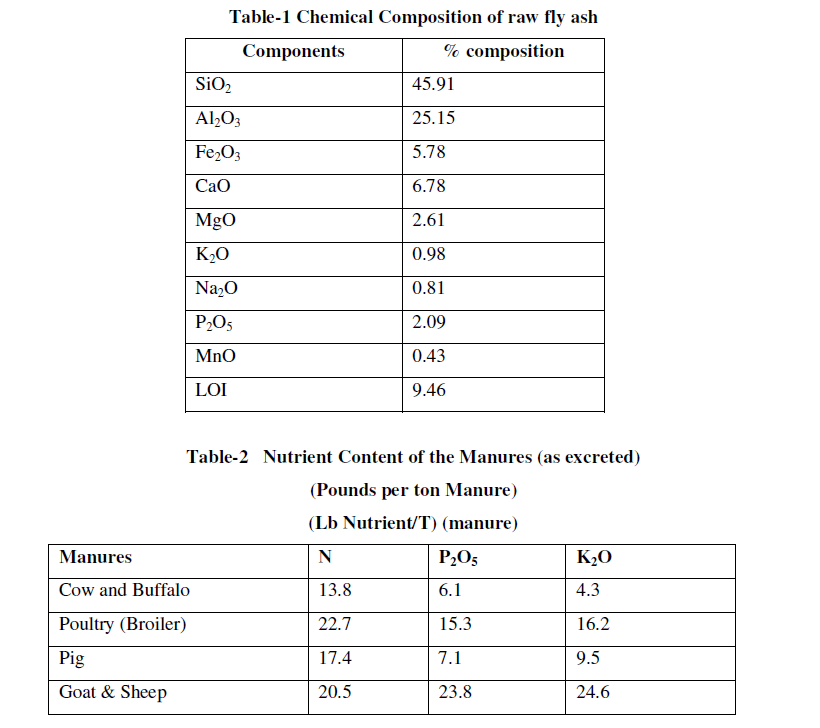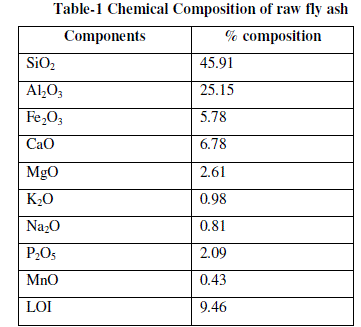ISSN ONLINE(2319-8753)PRINT(2347-6710)
ISSN ONLINE(2319-8753)PRINT(2347-6710)
T.K.Panda1, D.Rout2, S.Mohapatra2, B.Rout3 and B.B.Kar2
|
Visit for more related articles at International Journal of Innovative Research in Science, Engineering and Technology
In the present study an attempt has been made to compare the role of various organic manures in enhancing the N, P and K value of fly ash. In this regard, various organic manures have been added in different ratios and tested for a given time span. The observations have been made with respect to the Nitrogen, Phosphorus and Potassium content of the fly ash sample, which is subjected to modification. It has been found out that nitrogen content of the fly ash sample drastically rise with the use of poultry (Broiler) manure, whereas the potassium content is getting enhanced by sheep and goat manure extensively. Similarly, the phosphorus content of the fly ash can be enhanced by the use of cow, poultry and sheep dung in combination with the ratio 1:6:3. The results have been incorporated and compared adequately to prepare a modified sample of fly ash with high Nitrogen, Phosphorus and Potassium content
INTRODUCTION |
| Fly ash being an stable inorganic waste, its decomposition has become the biggest challenge for scientists and researchers. In comparison to the soil, fly ash satisfies all the properties except the content of nitrogen, phosphorus and potassium. The absence of these components has reduced the utility of fly ash as a soil substitute. Availability of these constituent in the organic manures have opened a new area of challenge to prepare a combined product of fly ash along with the organic manure, which are to be used to make fly ash a good fertile base material (1-5). |
| Now taking into consideration the animal manure, they are enriched with various types of nutrients including nitrogen, potassium and phosphorus. Nitrogen is the most important nutrient for plant, which absorbs nitrogen in the form of NH4+ and NO3-. Between these two states, plant absorbs nitrogen mostly as NO3-. Microorganisms responsible for nitrification remain active in the soil pH range between 6.5 to 7.5. Similarly in case of phosphorus, being an essential constituent in every living cell, its availability depends on the pH of the soil. In strongly acidic soil (pH 5 or less) phosphorus reacts with iron, aluminium, magnesium and other bases to form insoluble mass and unavailable for plant (6-10). The availability of phosphorus remains highest at a pH between 6.5-7.5. Similarly, potassium is an essential element for development of chlorophyll. The availability at potassium does not influence by soil reaction significantly. In acidic soil, potassium is lost through leaching. Similarly, when lime is applied to acidic soil to reclamation of acid, it results in increase in potassium fixation of soil and potassium becomes non-available in the soil. So, at a suitable pH all the three parameters N, K, and P remains adequate in a soil to enhance its fertility. |
| In the present study, a class-F fly ash is used as the base material in which the NPK concentration has to be enhanced. |
MATERIALS AND METHODS |
| The chemical composition of the fly ash is given in Table-1. To carry out the study, 4 different types of organic manures are taken into consideration and are added to the fly ash with specific conditions. The chemical composition of the manures are given in Table-2. |
 |
RESULT AND DISCUSSION |
| In order to enhance the NPK content of fly ash, different types of animal manures are added to it. The process of embedment of nitrogen, potassium and phosphorus is carried out in 3 different steps as given below:- |
| i. Activation of Fly ash |
| ii. Mechanical addition of manure |
| iii. Fermentation with fly ash at elevated temperature to avoid NKP fixation |
| Fly ash is activated using IN HNO3 solution added in 10 wt% to the fly ash and kept for 24hrs. In 24hrs the matrix modification takes place along with formation of adsorption matrix. The activated fly ash is then subjected to mechanical addition of manure at the ratio (20:1). The mechanical mixing is carried out for 30 minutes to get an uniform composition of manure to fly ash mixture. The uniform homogenous mixture is then subjected to fermentation by constant stirring up to 8hrs. The mixture is then subjected to drying at 1500C. The enrichment of individual manure mixed fly ash is subjected to chemical analysis to obtain the NPK content of the fly ash. The result obtained are incorporated in Table-3. |
 |
| The result obtained from above study revealed that raw flyash can be made enriched with NPK, using various animal manures. |
CONCLUSION |
| The study concludes that organic manures are the vital sources for enrichment of important nutrients in soil sample. In the present study, attempt has been made to convert waste fly ash into a base material for cultivation in place of soil. The experimental data revealed that by the addition of organic manures such as cow dung, goat dung, pig dung and poultry dung, it is possible enhance the nitrogen, phosphorus and potassium content of fly ash and it is possible to achieve a highly fertile fly ash medium which can be used as a substitute of soil. |
References |
|